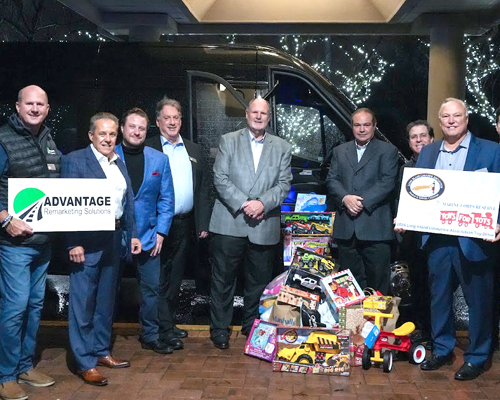
- Details
- Category: Industry News
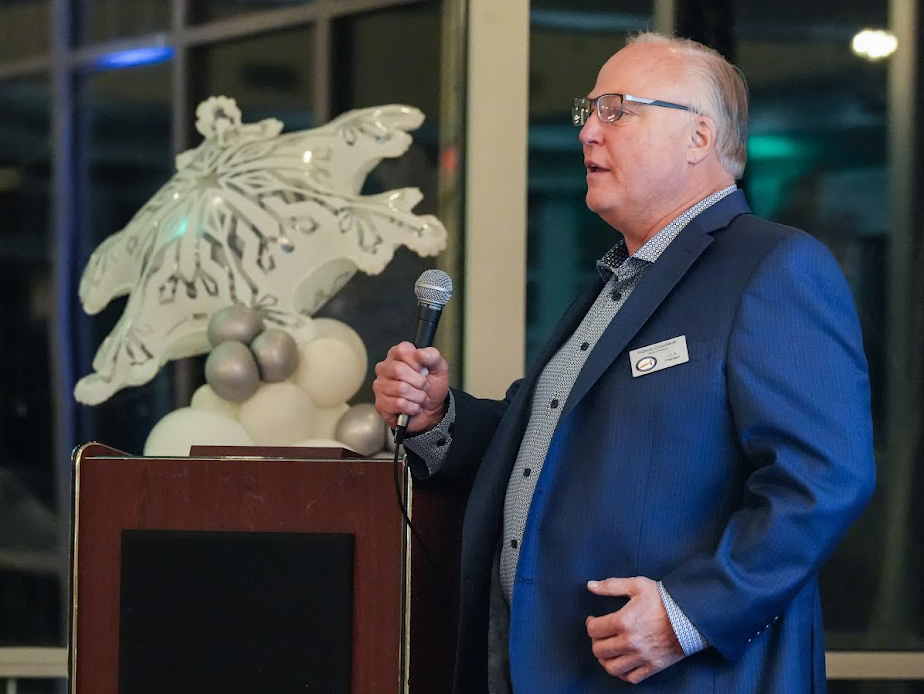 LILA President Tom Gouldsbury of Azure Limousine addresses the crowd
LILA President Tom Gouldsbury of Azure Limousine addresses the crowd
More than 60 members and guests headed to Wind Watch Golf & Country Club in Hauppauge, N.Y., on Wednesday, December 11, for the Long Island Limousine Association (LILA) holiday party and dinner. In addition to offering a delicious buffet dinner and valuable networking, the evening also gave members a glimpse of the association’s plans for the new year.
 L to R: Jeffrey Dupoux of DH2 Chauffeured Transportation, Mike Rose of My Limousine Service, Nancy Vargas of DH2 Chauffeured Transportation, Douglas Schwartz of Executive Limousine, Drew Messina of Create-A-Card, and Annette Snedaker of DH2 Chauffeured Transportation.
L to R: Jeffrey Dupoux of DH2 Chauffeured Transportation, Mike Rose of My Limousine Service, Nancy Vargas of DH2 Chauffeured Transportation, Douglas Schwartz of Executive Limousine, Drew Messina of Create-A-Card, and Annette Snedaker of DH2 Chauffeured Transportation.
“The meeting was very successful,” says LILA President Tom Gouldsbury of Azure Limousine. “We’re looking forward to a really robust 2025 where we’ve launched a new program against illegal operators. We’ve hired a PR firm, and we’re scheduling a press conference for late December. In January, we’re doing a breakfast for legislators and other politicians to catch their ear and inform them.”
The association has also had two meetings with the Suffolk County TLC about the issue of illegal operators. Currently, the biggest challenge for licensed operators is coming from Facebook pages that advertise cheap local transportation.
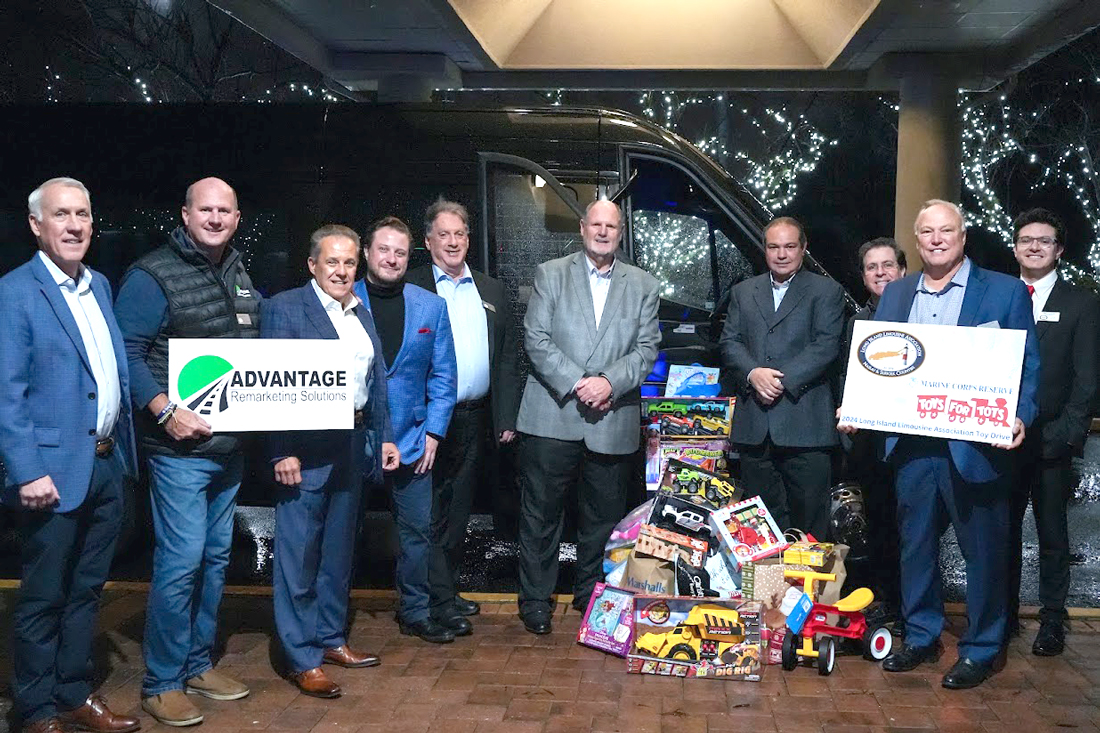 LILA teamed up with Advantage Remarketing Solutions to fill a Sprinter with donations for Toys for Tots
LILA teamed up with Advantage Remarketing Solutions to fill a Sprinter with donations for Toys for Tots
“Illegal operators are taking money out of our pockets and they’re driving with noncommercial plates. It’s about time that someone’s done something about it, and that’s what our association is trying to do. We’re never going to cure the problem, but we can have an impact on the situation,” says Gouldsbury.
Gouldsbury states that LILA has great support from their members to tackle this issue. Recently, the association got an NLA grant for $6,000, which will be used to help them kick off the program.
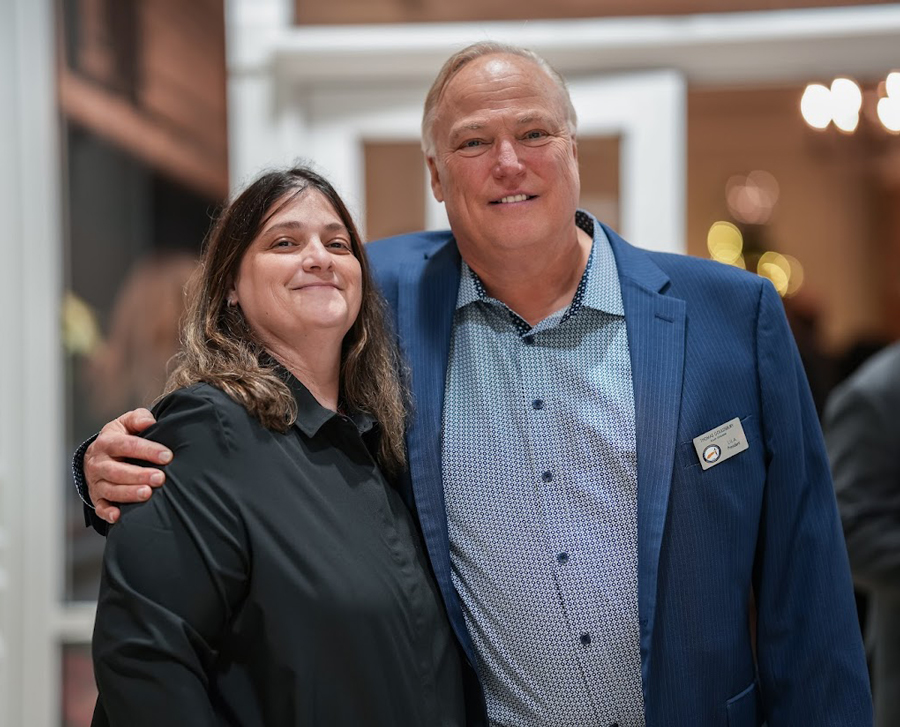 Ariel Ullberg and LILA President Tom Gouldsbury of Azure Limousine
Ariel Ullberg and LILA President Tom Gouldsbury of Azure Limousine
“We want to let the surrounding area know that the LILA exists and we’re here to support the community. We’re out to share public awareness,” he says.
While the issue of illegal operators was highlighted, the meeting also served as a Toys for Tots benefit, with Eric Coolbaugh from meeting sponsor Advantage Remarketing Solutions bringing a Sprinter to fill with new, unwrapped toys. Dozens and dozens of donations were brought by members to support the Marine Corps charity.
Other sponsors of the dinner meeting included Friedlander Group, Royale Limousine, Model 1 Commercial Vehicles, Rocky Mountain Coach, and IntelliShift.
LILA has plans to hold a meeting in March, shortly after the CD/NLA Show in Vegas.
Visit lilimoassociation.com for more information.
[12.17.24]
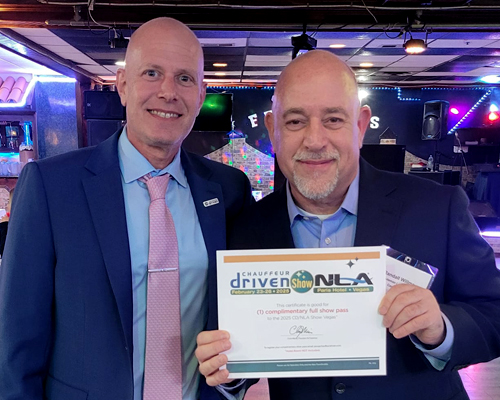
- Details
- Category: Industry News
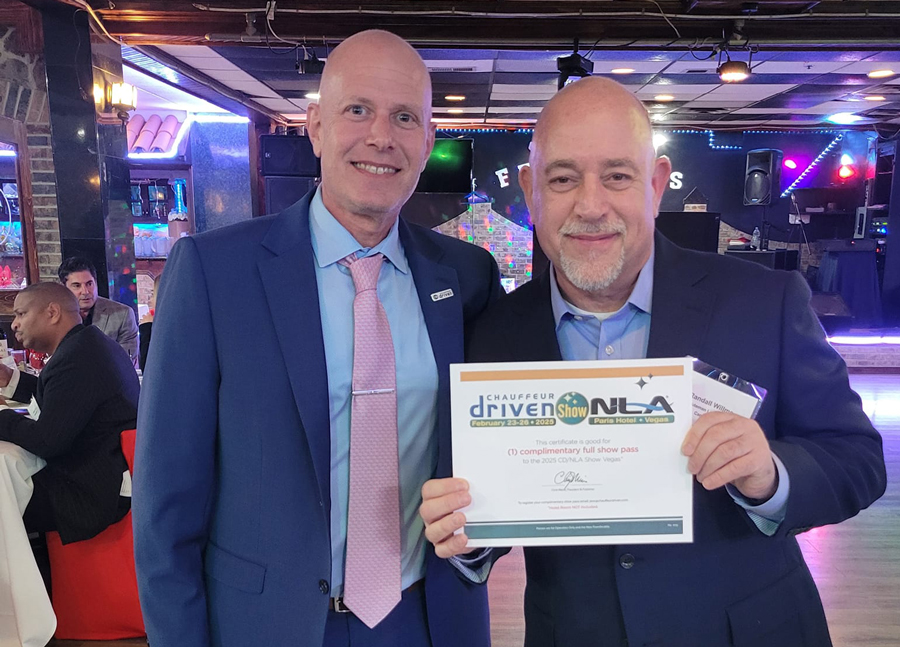 CD President Chris Weiss (left) with CD/NLA Show pass winner Randall Willms of Minuteman Limousine and Car Service
CD President Chris Weiss (left) with CD/NLA Show pass winner Randall Willms of Minuteman Limousine and Car Service  L to R: Dino Olivares of Complete Fleet, Davit Kitiashvili of A2B Corporate Sedan, Barry Trabb of Complete Fleet, and George Ioseliani of A2B Corporate Sedan
L to R: Dino Olivares of Complete Fleet, Davit Kitiashvili of A2B Corporate Sedan, Barry Trabb of Complete Fleet, and George Ioseliani of A2B Corporate Sedan
The holiday spirit was in the air—and meat was on the plate—at the holiday dinner meeting of the Chauffeured Transportation Association of New Jersey (CTANJ). Held December 12 at the Fernandes Night Club in Newark, more than 90 members from across the tristate area were in attendance, as well as vendors and guests from across the country. In addition to offering a tremendous Brazilian Rodizio steak dinner, in which decadent cuts of meat were sliced and served table side, the event also served as a Toys for Toys collection. Dozens and dozens of toys filled three giant boxes for the Marine Corps-sponsored charity.
Networking was on full tilt at the dinner, as the open-bar cocktail hour, sponsored by Buffalo Limousine, Complete Fleet Livery Sales, Fleetwood Worldwide World Class Chauffeured Services, and Leros Transportation Group, gave members an opportunity to catch up and share some seasonal cheer. A DJ was on hand to spin holiday and popular favorites. What would a party in NJ be without a little Springsteen?
 Lou Gastaldi from Garden State A-1 Car & Limousine Service (left) with CD Editor Rob Smentek
Lou Gastaldi from Garden State A-1 Car & Limousine Service (left) with CD Editor Rob Smentek  Three boxes of toys were collected for Toys for Tots
Three boxes of toys were collected for Toys for Tots
While an enormous array of appetizers and salads were being offered, CTANJ President Mike Rose of My Limousine Service addressed the attendees. He first introduced the board members in attendance, who were met with a round of applause. Rose also thanked the evening’s long list of sponsors, which included Dinner Sponsors Country Club Transportation, EmpireCLS, Gem Worldwide, and Stafford/Love Limousine as well as Appetizer Sponsors Ace Limousine & Airport Service, Chauffeur Driven, Create-A-Card, Dolphin Transportation Specialists, Executive Luxury Service, Key Transportation, Long Island Limousine Association, Metropolis Passenger Logistics, Model 1 Commercial Vehicles, PAX Training, RMA Worldwide, Special 1 Media, Sterling Limousine & Transportation Services, T-Mobile, and Vander Plaat Executive Limousine Service. Executive Director Patricia Nelson also got some well-deserved recognition from Rose, as he thanked her for all she does for the association. CTANJ Vice President Joe Gulino of Gem Worldwide and Treasurer Barry Trabb of Complete Fleet also took a moment to thank sponsors and offer some appreciation to Rose, who is completing his first successful year as CTANJ president.
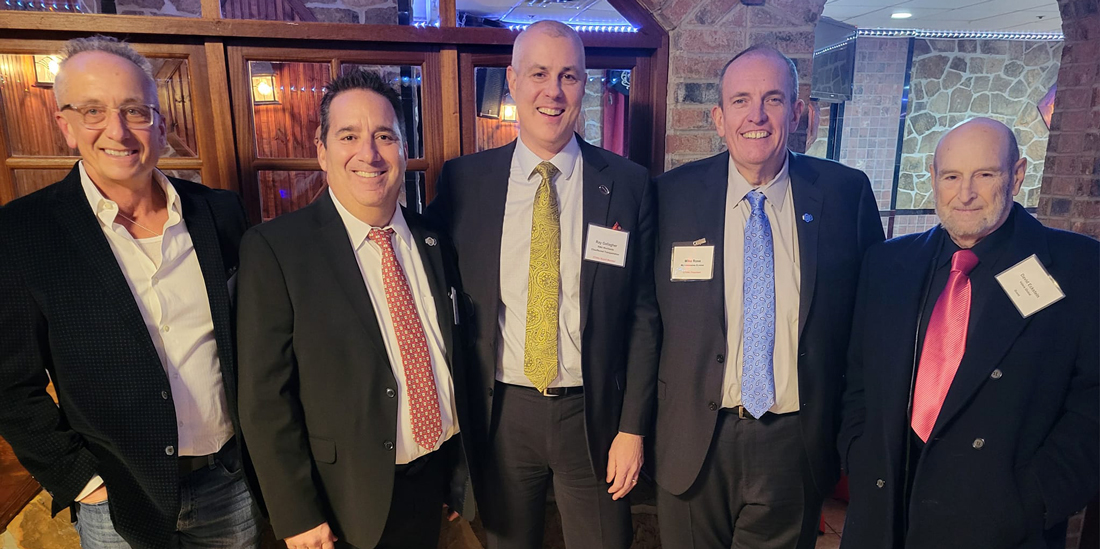 L to R: Carl Restivo of Advantage Remarketing Solutions, CTANJ Vice President Joe Gulino of Gem Worldwide, Ray Gallagher of RMA Worldwide, CTANJ President Mike Rose of My Limousine Service, and David Eckstein of Valera Global
L to R: Carl Restivo of Advantage Remarketing Solutions, CTANJ Vice President Joe Gulino of Gem Worldwide, Ray Gallagher of RMA Worldwide, CTANJ President Mike Rose of My Limousine Service, and David Eckstein of Valera Global  More than 90 members and guests were in attendance
More than 90 members and guests were in attendance 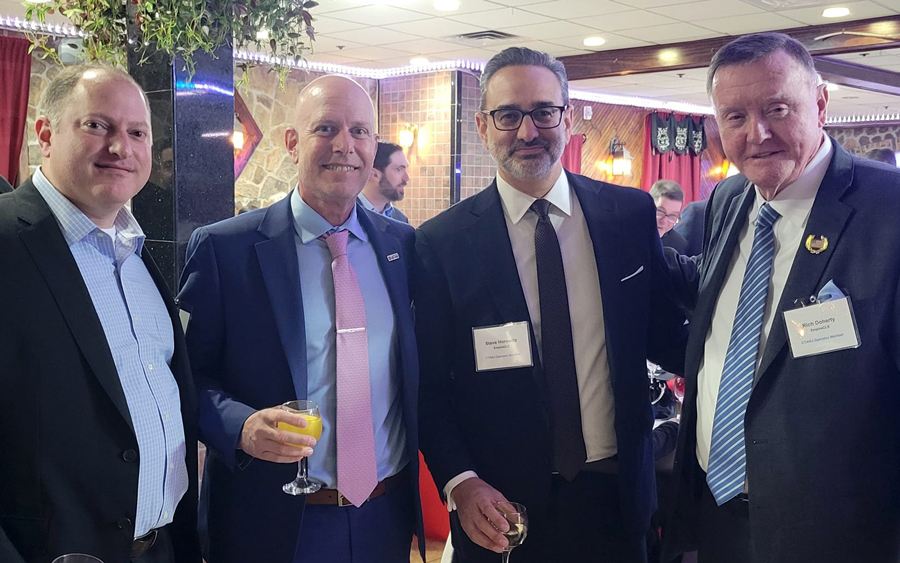 L to R: Josh Schneeweiss of Advanced Limousine & Worldwide Car Service, Chris Weiss, Steve Horowitz of EmpireCLS, and Rich Doherty of EmpireCLS
L to R: Josh Schneeweiss of Advanced Limousine & Worldwide Car Service, Chris Weiss, Steve Horowitz of EmpireCLS, and Rich Doherty of EmpireCLS
After dinner was served, Trabb acted as auctioneer as a CD/NLA Vegas Show pass was on the proverbial auction block. After some heated bidding, the winner was Randall Willms of Minuteman Limousine and Car Service, who will be joining hundreds of operators from around the world when the show returns to the Paris Hotel & Casino from February 23-26.
Visit ctanj.org for more information.
[12.17.24]
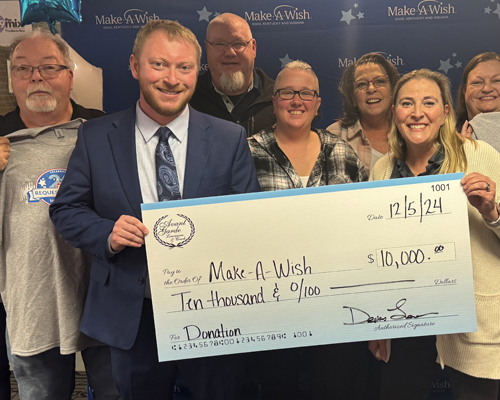
- Details
- Category: Industry News
 Avant Garde President Denny Leinhos and HR Manager Katie Jones went on air with the Smiley Morning Show
Avant Garde President Denny Leinhos and HR Manager Katie Jones went on air with the Smiley Morning Show  11 Avant Garde employees volunteered for Make-A-Wish
11 Avant Garde employees volunteered for Make-A-Wish
On Thursday, December 5, Avant Garde Limousines, Coach & Transportation, based in Indianapolis, attended the 28th annual Make-A-Wish Request-A-Thon hosted by 99.5 WZPL and Dave Smiley with The Smiley Morning Show. During this time Avant Garde President Denny Leinhos along with 11 other employees volunteered their time for 2 hours to help answer phones where callers would donate money and then request a song to help 250 kids in Indiana with critical illnesses. Leinhos and HR Manager Katie Jones also spoke on air over the radio to talk about the cause and the different trips Avant Garde has helped be a part of. This event went for 36 hours and was run by nothing but volunteers. In the end, $875,989 was raised which solely goes towards supporting the Make-A-Wish mission, which is based on the belief that a wish can be an integral part of a child’s treatment, and can help them build the strength to fight their illness.
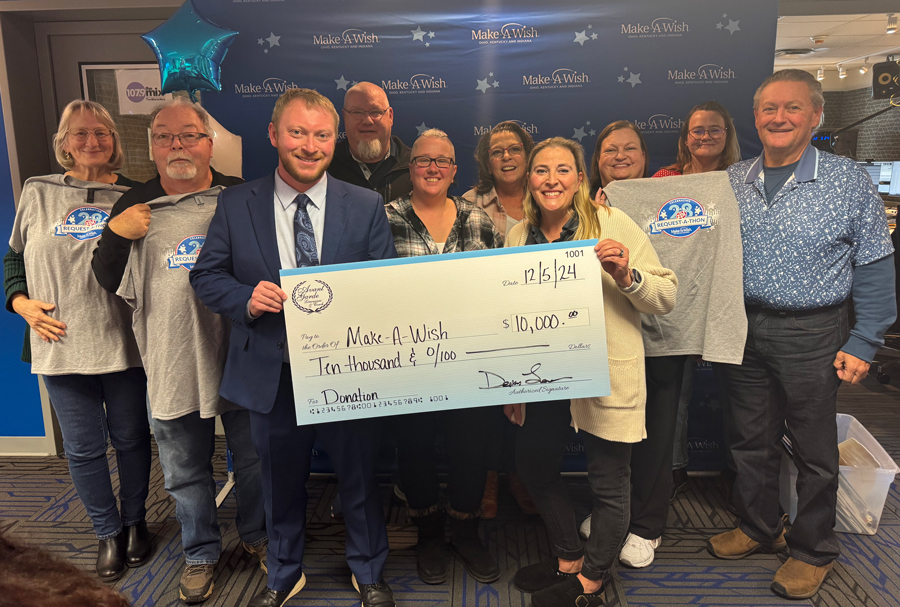 Avant Garde Limousines, Coach & Transportation presented Make-A-Wish Foundation with a check for $10,000
Avant Garde Limousines, Coach & Transportation presented Make-A-Wish Foundation with a check for $10,000
This is the sixth year that Avant Garde has partnered with Make-A-Wish in providing transportation for all Wish participants from rides to and from the airport for Disney World, to shopping sprees, wanting to be the Colts mascot Blue for the day, and the most recent event which was transporting 27 kids over 3 days to see Taylor Swift. So far Avant Garde has helped transport over 300 Wish participants and that number continues to increase. The average cost to fulfill a wish is $10,000 per child, and in the past Avant Garde has donated $4,000. However, this year Make-A-Wish was presented with a check for $10,000, which will help fulfill one full wish for a child. Along with the donation Avant Garde will also help support and sponsor the family that ends up being chosen to receive the Wish.
Visit avantgardelimos.com for more information.
[12.17.24]

